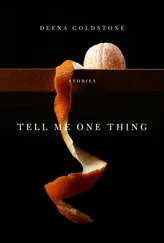Daniel watches his daughter while his breathing slows and stabilizes. He manages to get out the one word that defines his daughter, he feels— fierce —and Isabelle nods in agreement and sits quietly beside him, waiting for his heaving chest to quiet before she starts the conversation she wants to have.
“Talk to me about the book.”
“Don’t you ever give up?”
“You taught me not to.”
“Totally unfair answer.” His voice is gruff, and he turns away from her.
“Fairness has nothing to do with what we’re doing here. Tell me.”
“No.”
And then there’s a hard-edged silence between them. Daniel’s No is unequivocal, and Isabelle sits there scurrying around in her mind, trying to find a lateral strategy, a way to sneak up on the answer she needs.
“Does Bev know what it’s about?”
“Not this one. If she had known, she wouldn’t have called you.”
“Alina called me, not Bev.”
And that piece of information startles him. She can see it. He watches his daughter move from plant to plant, lovingly clearing the soil around each one, before he says, “I wouldn’t have thought she cared enough.”
“Oh, Daniel, sometimes you can be so dense.”
—
ISABELLE MAKES LUNCH FOR THE TWO of them. Daniel eats very little, and unlike Bev, she doesn’t push him to eat more. She just wraps up the untouched food and puts it back in the refrigerator. Then he settles down on the sofa. Isabelle covers him with Bev’s afghan and settles herself into one of the old armchairs. She reads to him until he falls asleep — today it’s from Colm Tóibín’s Brooklyn, a novel she’s recently read and thinks he’ll respond to. It’s a plain-speaking work and very moving — both attributes Daniel admires.
This is his favorite time of the day. Isabelle is here. She’s asking nothing from him. He can listen to her voice and drift. He knows she will be there when he wakes.
While Daniel sleeps, Isabelle walks. At first she varied her route, exploring the land around the O’Malleys’ complex, but once she found the beaver dam, she felt compelled to return to it every day. Now she makes her way through the shade of the dense forest growth, across the bright sunlight of open fields, often scattering flocks of wild turkeys, which cackle in protest as she passes, then down the two-lane road and up to a much larger pond than Foyle’s whose name she doesn’t know.
The beavers are always there — a family, she’s decided, and everyone pitches in. The parents take on the trees surrounding the pond, chipping out a wedge of wood from the trunks with their large orange front teeth, gnawing over and over again until it looks like a woodsman has been hacking away with an ax. When a tree topples of its own weight, right into the water with a resounding and satisfying splash, Isabelle feels like cheering.
The younger beavers’ job seems to be bringing up stones from the bottom of the pond and fitting them under the fallen trunks, solidifying the base of the dam. The entire family of four is responsible for diving to the bottom and scooping up sediment. Their tiny paws look amazingly like human hands as they push and pat the mud into place, cementing the branches, twigs, and larger tree trunks together. More twigs and limbs are brought into the water and positioned just so. More mud is brought up. The barrier grows. Each day Isabelle can see how much progress has been made in the intervening twenty-four hours. It’s astonishing to her how hard the beavers work and how ceaseless they are in their activity, and especially how they know exactly what to do, with no hesitation.
She could watch them for hours, but she always makes sure to wear a watch and to be back in the cottage before Daniel wakes up, so that when he opens his eyes, he will see her sitting there.
She’ll make him tea then and they’ll talk about some safe subject — the coming fall elections or the Boston Red Sox’s season now that Daniel has become a fan. They’re the kind of team he likes — tough, aggressive players — but despite winning the World Series in 2013, the team seems to be off to a bad start this year, and Daniel has concerns.
Isabelle knows a little about baseball; Michael is a San Francisco Giants fan, and she’s picked up some rudimentary knowledge from half listening to the broadcast games he seems to keep on all spring and summer. She knows enough to listen to Daniel’s indignation with the way the Sox are going and sympathize.
One day he asks her to describe the bookstore. He wants to be able to “picture it in my mind.” He wants to be able to place Isabelle there when she’s back in Oakland. And so she describes the corner it’s on — College and Crescent, within walking distance of the Berkeley campus but not too close. How the front door is glass and she’s left the old-fashioned bell Meir had attached to it to announce a customer. How the front counter is tall and she sits on a high stool behind it.
“Is that where you e-mail me?” Daniel asks.
“Mostly, on my laptop.”
And Daniel nods; he can see her there now, doing it.
She tells him the story of how she convinced Meir, years ago, to carry some new books and display them at the very first table you see when you walk in. She describes the small, cozy sofa to the right of the front door, slipcovered now in a deep burgundy twill, and the steamer trunk they use as a coffee table and how people can sit there and browse through a book, even put their feet up on the trunk, since it’s well worn, and relax into the reading experience.
She tells him about the changes she made after Meir died eight years ago. How she painted the walls of the shop, which probably hadn’t been touched since Meir first bought the store, a warm cream color and replaced the rickety old metal shelves with custom-built wooden ones. How she hired an old-fashioned sign painter to etch onto the large front window of the store, the one that fronts on College, NOAH’S ARK, BOOKS in shiny black letters shadowed with a sliver of gold, and underneath the store’s name, MEIR SCHAPIRO, FOUNDER.
She tells Daniel how she’s kept all the books she inherited. She couldn’t throw out a single one, even though many of them were so esoteric she knew no one would ever buy them. But she just dusted them off and reshelved them. They were Meir’s children, it felt like, and there was no abandoning them. So the shelves at the back of the store remain a shrine to Meir’s belief in the unpopular, the obscure, the arcane, the unloved. Once in a while she’ll sell one of those books. In fact, that’s how she met Michael. And Isabelle tells Daniel that story, which she can tell he appreciates.
In those free-ranging afternoon conversations, Isabelle and Daniel move back into the easy intimacy that they once took for granted. The talk flows without pause. They interrupt each other without hesitation, tease each other occasionally, know exactly what the other means even when the other is searching for the right words. It’s so easy to talk, so easy to amuse, so easy to understand exactly the point.
But today when Daniel wakes, he’s furious. He’s pulled himself from a dream he immediately wants to forget. Images linger — a stark and empty hillside, merciless wind, and the sky dark with heavy clouds — a goddamn Victorian novel! He’s dreaming a scene that belongs in Wuthering Heights . He’s had the dream before, various versions of it. There’s always a gaping hole in the earth, bottomless, a closed coffin which somehow he knows is his, and cries of grief coming from a source he can’t locate in the dream. Not very subtle. Even his dreams have gotten mundane and predictable, and he’s disgusted with it all — himself, his situation.
Читать дальше












